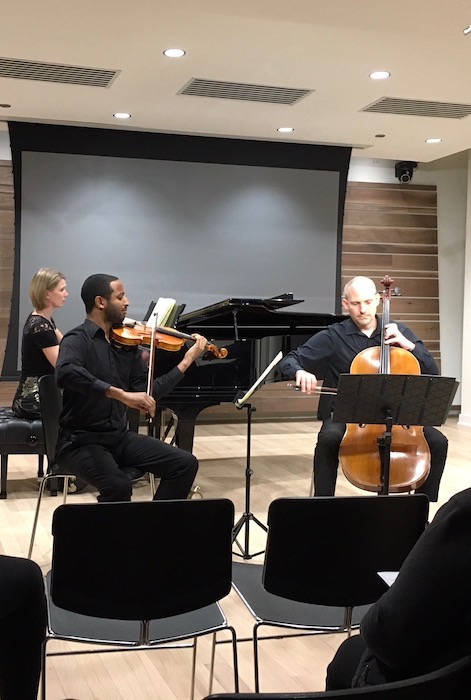Crossing Borders offers a bracing mix of music by African-American women

In its second year, Impromptu Fest might have changed venues—swapping the old-world charm of Chopin Theatre for Guarneri Hall, a spanking-new Loop venue—but its ambition remains untouched. As with last year’s debut, the festival hosted eight concerts in two weeks, all of them double-bills.
This year’s Impromptu Fest wrapped on Sunday afternoon, when players from Crossing Borders Music and Elmhurst College championed works exclusively by African-American women.
Crossing Borders’ program was framed by 20th-century composers celebrated in their lifetime but rarely programmed today—like Florence Price and Undine Smith Moore—while the rest of the concert was filled out by a younger guard, who, decades after Price and Moore’s deaths, still find themselves blazing trails. Jordyn Davis, who was in attendance, was the youngest composer on the program. (Davis will be the first black woman to receive a bachelor’s degree in composition from Michigan State when she graduates this May.)
Heritage, history, and those that came before were omnipresent themes during Sunday’s concert, starting with Moore and Price’s own Janus-faced pieces. Moore’s Afro-American Suite (1969) for piano trio and Price’s Five Folksongs in Counterpoint (dated 1951 but possible from as early as 1927) for string quartet. The thematic material for both sprouted from African-American spirituals, though the two composers’ handling of the melodies couldn’t be more different.
In Moore’s Suite, the strings declaim the main line while the piano extrapolates harmonically, sometimes veering into Ivesian territories. Violinist Kyle Dickson and cellist Tom Clowes carried the tunes mostly matter-of-factly, sometimes wanting a more rhapsodic sweep. Marianne Parker’s piano playing was a cut above, offering well-sculpted phrases and impassioned pealing.
Three of the five movements of Price’s Folksongs also sprouted from spirituals. Wry thematic transformations are passed around as part of a decadent counterpoint. Nearly seven decades after her death, Price’s music is enjoying an overdue revival; the endlessly inventive, never repetitive Folksongs makes it easy to see why.
Violinist Rasa Mahmoudian and violist Sixto Franco joined Dickson and Clowes in a shapely, synergic performance — some of the tightest ensemble of the afternoon. The quartet took well to the Folksongs’ egalitarian writing, with Mahmoudian and Franco adding a nicely schmaltzy sheen to their solo turns.
Brittany J. Green turned to a more personal past in her Portraits for solo piano (2017). Based on five of her grandmother’s unpublished poems, her writing is cinematic in the best sense: gestural, minimal yet detailed, but packing an emotional wallop, especially under Parker’s sympathetic fingers. (The standout movement is “L’homme durci,” a searing, minute-long maelstrom.)
Elizabeth A. Baker’s “Rain on the Cotton Fields,” one of two movements from 2015’s Memories from Beyond, was similarly cinematic, if not quite as inspired. Recorded rain sounds set the atmosphere for the piece, eventually mimicked in a piano ostinato while the violin and cello sustain long tones. The spotlight is mostly on the piano, which ebbs and flows with the roiling storm.
Dickson and Franco paired up for Davis’s What Have You Done (Who Are You?), a propulsive, mostly pizzicatoed duet for violin and viola. Davis is clearly a gifted young composer to watch if this varied, tightly crafted and versatile 2018 work is a taste of works to come. Dickson and Franco seemed taken with the work, delivering a stellar performance, playing the five-minute work with effusive zeal.
Flutist Madeleine Wilmsen, of Elmhurst College, merits special mention for the first part of the afternoon’s double bill, and especially for selecting Danza de la Mariposa (2011) by Valerie Coleman (flutist of the Imani Winds). Inspired by South American folk traditions, the composition for solo flute is a hair-raising tour de force, big on emotional breadth and unyielding in its technical demands. Barring some wispy moments, Wilmsen more than rose to the occasion, confidently traversing the piece’s smorgasboard of styles and extended techniques.
Crossing Borders Music will repeat this program 3 p.m. April 14 at Skokie Public Library. They will also offer a second program of different works by African-American women 2 p.m. Sunday at the Chicago Cultural Center. Both programs are free and open to the public. crossingbordersmusic.org
Posted in Performances


